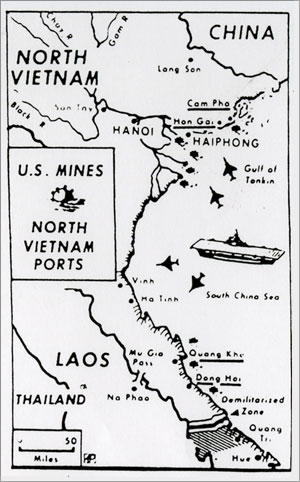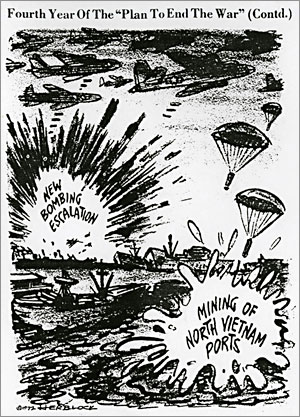




Advanced Search
Dress Up | 1st Person | African American Map | Now Read This | Magic Lens | Tool Videos | Architecture | e-Postcards | Chronologies
Robert Romer - 1972: Vietnam War Protests at Westover Air Force BaseDuring the Vietnam War, Robert Romer committed acts of civil disobedience (actions in which one breaks the law to follow one’s conscience with the hope of bringing about political change). He remembers, “The only time[s] that I've ever got arrested were for sitting down on the road in front of Westover Air Force Base...” Learn more about Robert Romer: View a timeline of his life and listen to his full interview. Stories by this speaker

This map indicates United States' mines planted in North Vietnamese Ports. In a televised broadcast on May 8, 1972, President Richard Nixon announced that he had ordered the mining of North Vietnamese harbors. The objective was to cut off military supplies to Hanoi, the capitol of North Vietnam. The next day, an Associated Press article appearing in the Greenfield Recorder, a western Massachusetts newspaper, reported that while Washington awaited international response to the President's announcement, "demonstrations against Nixon's action were in progress within hours on at least four of the nation's campuses." Robert Romer recalls that the second time he protested at the Westover Air Force Base, "the president of Amherst College decided to join the protest and there were quite a few hundred Amherst College faculty and students, and we all went down and sat together." Amherst College President John William Ward wrote about his decision to the students of the college. His letter was published in the New York Times on March 13, 1972. He wrote, in part: What I protest is not what has been done. What is done is done. No word of mine, no word of yours will change it. What I protest is what may come next. What I protest is there is no way to protest. I speak out of frustration and deep despair. John Dos Passos once wrote, "we only have words against Power..." I do not think words will now change the minds of men in power who make those decisions. I do not. Since I do not, I do not care to write letters to the world. Instead, I will, for myself, join in the act of passive civil disobedience... [More of this letter can be read by following the link below.] Associated Press Wire-photo. Published on the front page of the Greenfield Recorder on May 9, 1972. 
A political cartoon with the ironic title “Fourth Year of the ‘Plan To End The War’ (Contd.)” illustrates the results of President Nixon’s then-recent decision to have mines placed in North Vietnamese ports so that the Soviet Union would be unable to deliver military supplies to North Vietnam. Prior to being elected President in 1968, Richard Nixon promised that he had a secret plan to end the Vietnam War. Despite this campaign promise, the United States invaded Cambodia and intensified bombings in North Vietnam during the years of his Presidency. The artist refers to this broken commitment in the title of the political cartoon illustrated here. Published in the Greenfield Recorder on May 15, 1972. Story Clip #1:Getting arrested at Westover Air Force Base Wait for each file to download, then click the arrow to play the audio. I never got arrested on the Amherst Common. We had a vigil. I spent a lot of time Sunday mornings, silent vigils protesting the Vietnam War on the Amherst Common. The only time that I've ever got arrested were for sitting down on the road in front of Westover Air Force Base, which is—what?—ten, twenty miles from Amherst. In the spring of '72 at the time of the bombing of the Hanoi Harbor and a group of us, motivated by a Quakers—I'm not religious, I'm not even a Quaker—but I decided to go and join the protest at Westover Air Force Base, and commit civil disobedience. We were protesting the escalation of the war in Vietnam by blocking the entrance to Westover Air Force Base and, I actually did it twice. I wasn't with the very first group who did it. The first time I went and deliberately joined the civil disobedience, there was about six or ten of us I think. It was a cold, rainy day, early May, I think, and as I say, there were not very many of us, and we walked out into the road in front of the main gate at Westover and sat down. And that was a little scary because there weren't that many of us, as I said, and one side was the gate with MPs with unpleasant–looking guard dogs; on the other side there were workers in their cars waiting to get into their shifts, and we were blocking the road. There was always possible that one of them would say, "The hell with these peaceniks" and step on the gas and run over some of us. And it was also cold. I got arrested and charged with Disorderly Conduct, which wasn't true, and Disturbing the Peace, which was kind of ridiculous 'cause I wasn't—I mean, that was the whole idea—I wasn't disturbing the peace; I was trying to help bring it. And Obstructing a Public Highway—well, I could hardly deny the latter, so...Anyhow, they stuck us on a bus, they took us down to the police station, they finger printed us, they put us in a jail cell for a few hours, and then some nice man who volunteered to be our lawyer came and got us out. I didn't even spend the night in jail, but, it was pretty peaceful. I've never been arrested before, or since. I was arrested again the next week, but, except for those two occasions, that's the extent of my criminal record. And, you know, they were only misdemeanors. And the second time was much more of a circus, as there was—this had been building up during the intervening week, and then the president of Amherst College decided to join the protest and there were quite a few hundred Amherst College faculty and students, and we all went down and sat together and that was not scary at all cause there was so many people. But it was the same thing, put on a bus, we caused a lot of trouble for the Chicopee police. Some of us actually wrote some checks to the Town of Chicopee to help defray their extra police costs afterwards and then, when it came up in court, both times I was charged with Disorderly Conduct, Disturbing the Peace, and Obstructing a Public Highway, and since two of the three things I was charged with I didn't do, and one I did, I deci[ded to]—compromise, I pleaded guilty once, and I pleaded "no lo" once and I think I was fined $10 or something and, it sounds kind of light–hearted now, I guess. I didn't think of it that way at the time—even if there's no risk involved and even if it's something like sitting down on a highway with no risk at all, there's something symbolic about deliberately breaking the law and being willing to pay the penalty, which might have been a month in jail, or it might have been a serious fine, or it might be nothing, and, don't really know, but there's something symbolically important. It's not something you do lightly, even if it's a misdemeanor, which it, without a serious penalty, something important about doing it. Related ResourcesThe following source file was not found: ebdav/centuries/html/resource/romer1972.html
|
| |
Home | Online
Collection | Things To Do | Turns
Exhibit | Classroom | Chronologies | My
Collection
About This Site | Site
Index | Site Search | Feedback